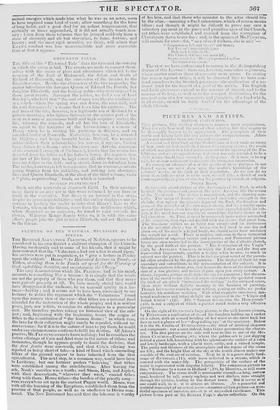FLEMING ON THE NATURAL NECESSITY OF TITHES.
THE Reverend ALEX:ANDER FLEMING, of Neilston, appears to be considered in his own district a stalwart champion of the Church. Having incidentally said to some of his friends, that it might be demonstrated that the "Voluntaries had not a foot to stand upon," his services were put in requisition, to " give a lecture in Paisley upon the subject." Hence "An Historical Lecture on Teindi., or Tithes, showing them to be Funds set apart fin. the Worship V God, upholding Sacr?'fice, and ma intainia,,, the Clecgy.- The easy demonstration which Mr. FLEMING had in his mind, amounts to something like a truism : it is simply that the teinds are not the property of those who pay them, and that they never werepricate property at all. To have merely stated this, would have disappointed the audience, by an unusual quality in a lec- turer—brevity ; and it seems not to have been convenient to our lecturer to notice the argument which the " Voluntaries" found upon this narrow view of the case—that tithes are a national fund intended for the instruction of the whole people; and it is neither pious, just, nor politic, to confine its advantages to a particular Sect, He therefbre prefers taking an historical view of the sub- ject ; and, beginning with the beginning, traces the origin of tithes to the constitution of " the human frame:" in which ease, the laws for their collection might surely be repealed, without in- convenience; for if it is in the nature of man to pay them, he would under any circumstances continue to fulfil his destiny. Of Adam's practice, Mr. FLEMING seems to know nothing ; but he considers the votive offerings of Cain and Abel were in the nature of tithes; and insinuates, though he appears gently to doubt the doctrine, that the first fruits were one-tenth, and that Cain's offering was rejected as being short of tale,—a kind of fraud which succeeding tillers of the ground appear to have inherited from the first agriculturist. The next step, in a common way, would have been to Leviticus; but our lecturer prefers "believing" that tithes were established among the antediluvians. After leaving the ark, Noah's sacrifice was a tenth; and Shem, Ham, and Japhet, With their descendants, " wherever they went," carried tithes along with them. Hence tithes—the burden of the priestly song— were everywhere set up in the ancient Pagan world. Moses, wise with all the learning of the Egyptians, established them from the practice of that people, as well as in obedience to Divine com- mand. The New Testament has said that the labourer is. worthy of his hire, and that those who minister to the altar should live by the altar,—meaning a fixedi subsistence, which of course means tithes; and though it might be difficult to prove any save a voluntary payment in the purer and primitive ages of the Church, yet tithes were established and exacted frotn the corruption of Christie nit) down to our day ; and, in the opinion of Mr.FLEN11:le, Will 4.:1111rc for ever—fur, " as a church (tithes), she is sate"— " Empires limy NI, and S1:1•Ts4 and States; But l' inlp:.ri,-11able gales Defy each 11•,tile ;hock :
The Clpircli of Clot-; ean never fall ;
Strong 'IlvvvEs-protectel 'Ls fouuded ea a rock."
The view we have endeavoured to convey is the disting,uishing
feature or this Lee I : thero are, h.) \veVer, Spine other arguments,
whese matter renders them of twee more grave. lit stating
the reason against tithes, it will be observed that w..■ have con- fined ourselves to the Scottish gri.Amive—the anplicatim of a na- tiomd fund for the beneilt of a port or the natim. The English and Irish grievances extend to the amount of impqst, and to the manner of its levy, es well as ta the 'milted distrilanion, for the
personal gain of a few sinecetists and s, of a fund which, at all ei eats, should be fairly divi led fur the advantage of the whole Church.


























 Previous page
Previous page